Translations of Gackt's Fuurin Kazan blog entries~ May to September
I've finally caught up on translating the rest of the blog entries that Gackt did for the Fuurin Kazan blog. ^^; Sorry it took so long! The first entry was way back in April and the translation is here. The rest are under the cut below~

Enjoy~~ :D
Please do not copy, take, redistribute, retranslate or repost this translation without my permission~ thanks!
5/28 Nagao Kagetora (Uesugi Kenshin) Gackt
A stoic way of life
We filmed the scene where Kagetora burns cedar-sticks and chants the mantra at the altar of the Bishamon[1]. Even though it's on a studio set, when I see the figure of the Bishamonten in front of me, my back immediately straightens. And I can truly understand the feeling Kagetora had when he faced the Bishamonten "in order to discipline (him)self." It's because, every day, I live a stoic lifestyle.
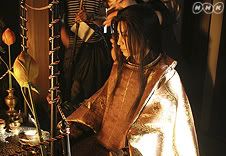
Why is it that I discipline myself. It's because I understand my own "careless side and weak side". Being fearful and cowardly, I was afraid that those parts of me would come out, and to prevent the carelessness and weakness from coming out, I imposed rules on myself. Living my life by conforming to those rules every day is my style of living. For example, eating habits. My rule is one meal per day, and to severely restrict the amount of carbohydrates. In particular, I haven't eaten rice in close to ten years. Also, I generally sleep two to three hours a day. I sleep at night at 1 a.m., and wake up in the morning at 3 or 4 a.m. My staff arrives at my house and we train for about three hours before heading off to work.
There are people who ask if I'm destroying my body. However, I've continued to live like this (for years), and there hasn't been one time where it's been bad for my body. Instead, my body has gotten even better. More so than being something I can continue to do with willpower, I believe it's something that can truly be done through training of the body and the mind. If you discipline (yourself), then your mind and body will be able to follow in proportion to that discipline.
As humans age, they tend to start feeling sluggish. I'm also afraid that I will start feeling sluggish. For that reason, I want to continue stoicly disciplining myself so that I can constantly sharpen and hone my senses.
Notes:
[1] "Bishamon(ten)" (毘沙門天): the Buddhist god of war and warriors. Kenshin was known to revere this god, who was usually portrayed wearing armor and holding a spear. He used the first character of bishamonten, “bi” (毘), on his battle standard.
[2] "darashinai" (だらしない): slovenly; grungy; messy; sloppy; slouchy; untidy; slipshod; lax; loose; careless.
************************
6/24 Nagao Kagetora (Uesugi Kenshin) Gackt
The staff is a family that creates something together
What I have valued since entering the Taiga drama studio is the communication with the staff. A drama is something that is created not only by the actors, but it is created together with the entire staff. By greeting each other in between takes, and having all kinds of conversations, I want to be able to confirm, one by one, the feeling that we are creating this together. NHK has an extremely talented staff, so it is really fun to just have conversations with them.
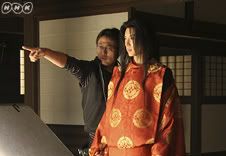
Even the other day, we pushed the filming to such an extent that it will remain in the Taiga drama's historical records. The filming that lasted a long period of time was certainly intense. But if you were to ask me, I'd say that it was even harder for the staff. Even still, not one person had a "difficult"[1] look on their face, and they tried their hardest. Therefore, we actors can't complain, and of course we have no intention of complaining. Moreover, because we want to respond to the feelings of such staff, we will never cut corners.
When I was talking about that, one staff person said, "Because we are keenly aware of those kinds of feelings, it makes us want to try even harder." At that time, I was really happy. Although I've always done things this way with regards to my music, it was a moment when I could confirm that my way of thinking and my attitude wasn't wrong, and for that reason I had an even greater feeling of wanting to do my best.
Although Kagetora's character is "aloof", if I just ponder by myself during the filming, then the distance between the staff and myself will widen, and the atmosphere will become edgy[2]. Because I feel strongly about valuing family, it is natural to engage in communication with the staff, and I hope that it continues from here on out.
That is my way of doing things, my way of living.
Notes:
[1] "kitsui" (きつい): tight; close; intense; demanding; tough.
[2] "gisu gisu" (ギスギス): bad mood; rude; edgy.
************************
7/22 Nagao Kagetora (Uesugi Kenshin) Gackt
My way of communicating
On the day we finally filmed the scene in which I make a major appearance, I met Ogata Ken, who plays Nagao Kagetora's strategist, Usami Sadamitsu, for the first time. Although Ogata-san was always one of my favorite actors, I really couldn't guess what kind of performance he would give this time on Fuurin Kazan. I took another look at Ogata-san's performances up to now, and peeked in on his rehearsal. Even there (at the rehearsal), he was speaking aggressively[1]. By doing that, I can come to know my partner, and to find a chance to like him even more. What's interesting is that working while feeling excited[2] is really the best. It's not just a matter of being in suspense[3]. I'm truly happy when I can remain feeling excited[2] and thrilled[3] during the actual filling.
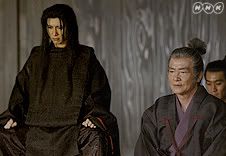
It seems that Ogata-san, anticipating that we would be co-starring together, continuously listened to my CD in the car. I thought about how the means to learn about our partner, the way to communicate with each other, is the same for everyone. I often shake hands with those I meet at work. That's a way of showing my intent to treat that person as a companion with whom I will be working to create something, and a way to show respect for my partner.
Because many of the co-stars and staff of Fuurin Kazan have much more of an acting career than I do, I have a strong sense that I want to learn from them and gain[5] from them. I think it's natural to be respectful to partners who teach, and it's natural to listen to their opinions. That thought, with respect to all the staff and co-stars, will never change.
Notes:
[1] "sekkyakutekini" (積極的に): active; affirmative; aggressive; feisty; vigorous.
[2] "doki doki" (ドキドキ): excited; heart throbbing.
[3] "hara hara" (ハラハラ): nail-biting; suspense; bated breath; with one's heart in one's mouth.
[4] "waku waku" (ワクワク): exciting; thrilling; suspense-filled.
[5] "nusumasete" (盗ませて): he literally says "steal" from them, but he probably means in the sense of stealing from their wealth of knowledge. Not that he literally wants to steal from them! XD
************************
8/19 Nagao Kagetora (Uesugi Kenshin) Gackt
Showdown with Shingen at Kawanakajima!
We went on-location to Nagano for ten days to film the battle at Kawanakajima, the drama's climax. We filmed the famous scene on the pastureland of a plateau, where Kenshin (known at this time as Uesugi Masatora), alone on his horse, faces Shingen across Kawanakajima. The wind, the scenery, and the atmosphere were all pleasant, and even while filming, it was really enjoyable. One thing though, was that we were at a very high altitude, so it may have been extremely difficult for some of the staff.
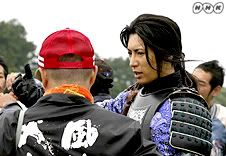
In the personal showdown between Kenshin and Shingen, Kenshin goes after Shingen with the image of a "raging tsunami", while Shingen sits and stops the attack. It was just like a breakwater. This was the first and last time in the drama that I was directly involved with Shingen, played by Kame-chan (Ichikawa Kamejiro). Not surprisingly, I thought he was dignified, and he reminded me of a "kabuki actor". It's interesting to see the unique characteristics of Kabuki in the way he turns his neck, or the way he makes detailed movements. Because it's him, those things are probably allowed[1].
Those things happen from time to time, don't they. For example, at Kawanakajima, I, playing Masatora, wear a bright blue armor. Including this hairstyle, if someone else had dressed like this they would really be criticized, but because it's ガクト (Gackt)[3], we can imagine that sort of thing. There's a certain Kenshin that can be portrayed by me, and there's a certain Shingen that can be portrayed because it's Kame-chan. I think it's a really fun thing to consider.
Notes:
[1] It's more like he’s saying he can get away with acting like that because it's Kame-chan.
[2] ガクト: “Gackt” written in katakana.
************************
9/23 Nagao Kagetora (Uesugi Kenshin) Gackt
“Life is a dream within a nap”
The biwa[1]-strumming Kagetora’s situation in life
This was the first time I played the biwa, but basically there really are no instruments that I can’t play, so it wasn’t particularly difficult. It’s just a matter of applying a technique. But after hearing the sound of the biwa, there were times when I thought that it would feel better to play it a certain way. That was my own feeling. Because in music there is no “This is right!” or conversely, “That is wrong!”, I played the biwa in the way I felt it should be played at that time.
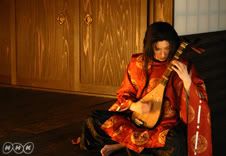
The biwa is an instrument that was originally brought over from China, but because it developed into a Japanese stringed instrument, I can strongly feel its history. The array of musical scales tells that (history), and (the sound is) surprisingly dark[2]; it’s a sound that seems to express Japan in those times. It’s like the sound you would hear if it was expressing the grief of all the people living in times of war. The heart of Japan during those times is revealed through the biwa, and exists in the echoes of the unique strings of the biwa; that is something which cannot be expressed through any other instrument. I think it’s amazing because this has been around since the Heian period[3].
As Kagetora playing the biwa, the image I had was, “Life is a dream within a nap.” Kagetora despaired of the age of civil war, and there may have been times when he sought relief from his feelings of hopelessness through the biwa. I have a feeling that by playing the biwa, he turned the grief, sadness, and loneliness in his heart into sound.
Notes:
[1] "biwa" (琵琶): the biwa is a four-stringed (or five-stringed) lute that originated in China.
[2] dark is referring to the sound, but by extension, it refers to the history as well.
[3] "Heian": The Heian period of Japanese history ran from 794 to 1185. "Heian" also literally means "peace". Because the biwa was brought to Japan in the Nara period, which preceded the Heian period, it's possible (and it seems to make more sense) that he is referring generally to times of peace rather than specifically the Heian period.
************************
Translator comments:
I knew he only slept a couple hours a day, but I've always wanted to know when he sleeps. Sounds like a typical sleeping pattern for college students actually. XD XD I remember those nights when I took that 1:00-3:00 nap while studying for midterms and hoping to fit some more info in my brain in those early hours before the test. Now, I can't survive without my 8 hours of sleep. XD;;;
I wonder if Gackt is a dream employee because he is such a hard worker? ^^ But you know, I can very much imagine him having a "take charge" attitude when it comes to his acting work, because we all know what a perfectionist he is. Something that might label an actor "difficult." So the entries where he talks about communication with the staff, and learning from other actors, was rather nice. I would love to see some behind the scenes clips of him interacting with the directors and other actors. It sounds like he really enjoyed learning from everyone.
It's too bad he didn't get to interact more with Kame-chan! XD I love his comments about Kame-chan's kabuki-style movements. It does make Harunobu's character unique among everyone else on the show. I need to see more of Gackt's acting to determine his style... Unfortunately, everytime he comes onscreen all I can think of is "It's GACKT!!" XD I do love how his character is so complex though, and makes you question Harunobu's motives and methods. Can't wait to see more~
I think the last entry was my favorite. I liked the way he described the biwa's sound as having "picked up" the sounds of the peoples' grief during war. I feel a similar, yet opposite, thing with the sanshin (Okinawan shamisen). When I hear the sound of a sanshin, I can sense the happy, laid back, and friendly atmosphere of a gathering of Okinawans. Part of it is just nostalgia--remembering those days when it was part of my life. But most of it does seem to be part of the instrument itself. Even the more somber pieces don't make me think of the sad and tragic history of Okinawa; on the contrary, they make me think of their peaceful nature. Anyway, I think it's amazing, too, that an instrument can express emotion through a unique sound.
Okay, that's all from me! I'd love to hear your thoughts too, so comment away! ~.^
also posted at eien no yume
x-posted to
uesugi_gakuto [ link]
Enjoy~~ :D
Please do not copy, take, redistribute, retranslate or repost this translation without my permission~ thanks!
5/28 Nagao Kagetora (Uesugi Kenshin) Gackt
A stoic way of life
We filmed the scene where Kagetora burns cedar-sticks and chants the mantra at the altar of the Bishamon[1]. Even though it's on a studio set, when I see the figure of the Bishamonten in front of me, my back immediately straightens. And I can truly understand the feeling Kagetora had when he faced the Bishamonten "in order to discipline (him)self." It's because, every day, I live a stoic lifestyle.

Why is it that I discipline myself. It's because I understand my own "careless side and weak side". Being fearful and cowardly, I was afraid that those parts of me would come out, and to prevent the carelessness and weakness from coming out, I imposed rules on myself. Living my life by conforming to those rules every day is my style of living. For example, eating habits. My rule is one meal per day, and to severely restrict the amount of carbohydrates. In particular, I haven't eaten rice in close to ten years. Also, I generally sleep two to three hours a day. I sleep at night at 1 a.m., and wake up in the morning at 3 or 4 a.m. My staff arrives at my house and we train for about three hours before heading off to work.
There are people who ask if I'm destroying my body. However, I've continued to live like this (for years), and there hasn't been one time where it's been bad for my body. Instead, my body has gotten even better. More so than being something I can continue to do with willpower, I believe it's something that can truly be done through training of the body and the mind. If you discipline (yourself), then your mind and body will be able to follow in proportion to that discipline.
As humans age, they tend to start feeling sluggish. I'm also afraid that I will start feeling sluggish. For that reason, I want to continue stoicly disciplining myself so that I can constantly sharpen and hone my senses.
Notes:
[1] "Bishamon(ten)" (毘沙門天): the Buddhist god of war and warriors. Kenshin was known to revere this god, who was usually portrayed wearing armor and holding a spear. He used the first character of bishamonten, “bi” (毘), on his battle standard.
[2] "darashinai" (だらしない): slovenly; grungy; messy; sloppy; slouchy; untidy; slipshod; lax; loose; careless.
************************
6/24 Nagao Kagetora (Uesugi Kenshin) Gackt
The staff is a family that creates something together
What I have valued since entering the Taiga drama studio is the communication with the staff. A drama is something that is created not only by the actors, but it is created together with the entire staff. By greeting each other in between takes, and having all kinds of conversations, I want to be able to confirm, one by one, the feeling that we are creating this together. NHK has an extremely talented staff, so it is really fun to just have conversations with them.

Even the other day, we pushed the filming to such an extent that it will remain in the Taiga drama's historical records. The filming that lasted a long period of time was certainly intense. But if you were to ask me, I'd say that it was even harder for the staff. Even still, not one person had a "difficult"[1] look on their face, and they tried their hardest. Therefore, we actors can't complain, and of course we have no intention of complaining. Moreover, because we want to respond to the feelings of such staff, we will never cut corners.
When I was talking about that, one staff person said, "Because we are keenly aware of those kinds of feelings, it makes us want to try even harder." At that time, I was really happy. Although I've always done things this way with regards to my music, it was a moment when I could confirm that my way of thinking and my attitude wasn't wrong, and for that reason I had an even greater feeling of wanting to do my best.
Although Kagetora's character is "aloof", if I just ponder by myself during the filming, then the distance between the staff and myself will widen, and the atmosphere will become edgy[2]. Because I feel strongly about valuing family, it is natural to engage in communication with the staff, and I hope that it continues from here on out.
That is my way of doing things, my way of living.
Notes:
[1] "kitsui" (きつい): tight; close; intense; demanding; tough.
[2] "gisu gisu" (ギスギス): bad mood; rude; edgy.
************************
7/22 Nagao Kagetora (Uesugi Kenshin) Gackt
My way of communicating
On the day we finally filmed the scene in which I make a major appearance, I met Ogata Ken, who plays Nagao Kagetora's strategist, Usami Sadamitsu, for the first time. Although Ogata-san was always one of my favorite actors, I really couldn't guess what kind of performance he would give this time on Fuurin Kazan. I took another look at Ogata-san's performances up to now, and peeked in on his rehearsal. Even there (at the rehearsal), he was speaking aggressively[1]. By doing that, I can come to know my partner, and to find a chance to like him even more. What's interesting is that working while feeling excited[2] is really the best. It's not just a matter of being in suspense[3]. I'm truly happy when I can remain feeling excited[2] and thrilled[3] during the actual filling.

It seems that Ogata-san, anticipating that we would be co-starring together, continuously listened to my CD in the car. I thought about how the means to learn about our partner, the way to communicate with each other, is the same for everyone. I often shake hands with those I meet at work. That's a way of showing my intent to treat that person as a companion with whom I will be working to create something, and a way to show respect for my partner.
Because many of the co-stars and staff of Fuurin Kazan have much more of an acting career than I do, I have a strong sense that I want to learn from them and gain[5] from them. I think it's natural to be respectful to partners who teach, and it's natural to listen to their opinions. That thought, with respect to all the staff and co-stars, will never change.
Notes:
[1] "sekkyakutekini" (積極的に): active; affirmative; aggressive; feisty; vigorous.
[2] "doki doki" (ドキドキ): excited; heart throbbing.
[3] "hara hara" (ハラハラ): nail-biting; suspense; bated breath; with one's heart in one's mouth.
[4] "waku waku" (ワクワク): exciting; thrilling; suspense-filled.
[5] "nusumasete" (盗ませて): he literally says "steal" from them, but he probably means in the sense of stealing from their wealth of knowledge. Not that he literally wants to steal from them! XD
************************
8/19 Nagao Kagetora (Uesugi Kenshin) Gackt
Showdown with Shingen at Kawanakajima!
We went on-location to Nagano for ten days to film the battle at Kawanakajima, the drama's climax. We filmed the famous scene on the pastureland of a plateau, where Kenshin (known at this time as Uesugi Masatora), alone on his horse, faces Shingen across Kawanakajima. The wind, the scenery, and the atmosphere were all pleasant, and even while filming, it was really enjoyable. One thing though, was that we were at a very high altitude, so it may have been extremely difficult for some of the staff.

In the personal showdown between Kenshin and Shingen, Kenshin goes after Shingen with the image of a "raging tsunami", while Shingen sits and stops the attack. It was just like a breakwater. This was the first and last time in the drama that I was directly involved with Shingen, played by Kame-chan (Ichikawa Kamejiro). Not surprisingly, I thought he was dignified, and he reminded me of a "kabuki actor". It's interesting to see the unique characteristics of Kabuki in the way he turns his neck, or the way he makes detailed movements. Because it's him, those things are probably allowed[1].
Those things happen from time to time, don't they. For example, at Kawanakajima, I, playing Masatora, wear a bright blue armor. Including this hairstyle, if someone else had dressed like this they would really be criticized, but because it's ガクト (Gackt)[3], we can imagine that sort of thing. There's a certain Kenshin that can be portrayed by me, and there's a certain Shingen that can be portrayed because it's Kame-chan. I think it's a really fun thing to consider.
Notes:
[1] It's more like he’s saying he can get away with acting like that because it's Kame-chan.
[2] ガクト: “Gackt” written in katakana.
************************
9/23 Nagao Kagetora (Uesugi Kenshin) Gackt
“Life is a dream within a nap”
The biwa[1]-strumming Kagetora’s situation in life
This was the first time I played the biwa, but basically there really are no instruments that I can’t play, so it wasn’t particularly difficult. It’s just a matter of applying a technique. But after hearing the sound of the biwa, there were times when I thought that it would feel better to play it a certain way. That was my own feeling. Because in music there is no “This is right!” or conversely, “That is wrong!”, I played the biwa in the way I felt it should be played at that time.

The biwa is an instrument that was originally brought over from China, but because it developed into a Japanese stringed instrument, I can strongly feel its history. The array of musical scales tells that (history), and (the sound is) surprisingly dark[2]; it’s a sound that seems to express Japan in those times. It’s like the sound you would hear if it was expressing the grief of all the people living in times of war. The heart of Japan during those times is revealed through the biwa, and exists in the echoes of the unique strings of the biwa; that is something which cannot be expressed through any other instrument. I think it’s amazing because this has been around since the Heian period[3].
As Kagetora playing the biwa, the image I had was, “Life is a dream within a nap.” Kagetora despaired of the age of civil war, and there may have been times when he sought relief from his feelings of hopelessness through the biwa. I have a feeling that by playing the biwa, he turned the grief, sadness, and loneliness in his heart into sound.
Notes:
[1] "biwa" (琵琶): the biwa is a four-stringed (or five-stringed) lute that originated in China.
[2] dark is referring to the sound, but by extension, it refers to the history as well.
[3] "Heian": The Heian period of Japanese history ran from 794 to 1185. "Heian" also literally means "peace". Because the biwa was brought to Japan in the Nara period, which preceded the Heian period, it's possible (and it seems to make more sense) that he is referring generally to times of peace rather than specifically the Heian period.
************************
Translator comments:
I knew he only slept a couple hours a day, but I've always wanted to know when he sleeps. Sounds like a typical sleeping pattern for college students actually. XD XD I remember those nights when I took that 1:00-3:00 nap while studying for midterms and hoping to fit some more info in my brain in those early hours before the test. Now, I can't survive without my 8 hours of sleep. XD;;;
I wonder if Gackt is a dream employee because he is such a hard worker? ^^ But you know, I can very much imagine him having a "take charge" attitude when it comes to his acting work, because we all know what a perfectionist he is. Something that might label an actor "difficult." So the entries where he talks about communication with the staff, and learning from other actors, was rather nice. I would love to see some behind the scenes clips of him interacting with the directors and other actors. It sounds like he really enjoyed learning from everyone.
It's too bad he didn't get to interact more with Kame-chan! XD I love his comments about Kame-chan's kabuki-style movements. It does make Harunobu's character unique among everyone else on the show. I need to see more of Gackt's acting to determine his style... Unfortunately, everytime he comes onscreen all I can think of is "It's GACKT!!" XD I do love how his character is so complex though, and makes you question Harunobu's motives and methods. Can't wait to see more~
I think the last entry was my favorite. I liked the way he described the biwa's sound as having "picked up" the sounds of the peoples' grief during war. I feel a similar, yet opposite, thing with the sanshin (Okinawan shamisen). When I hear the sound of a sanshin, I can sense the happy, laid back, and friendly atmosphere of a gathering of Okinawans. Part of it is just nostalgia--remembering those days when it was part of my life. But most of it does seem to be part of the instrument itself. Even the more somber pieces don't make me think of the sad and tragic history of Okinawa; on the contrary, they make me think of their peaceful nature. Anyway, I think it's amazing, too, that an instrument can express emotion through a unique sound.
Okay, that's all from me! I'd love to hear your thoughts too, so comment away! ~.^
also posted at eien no yume
x-posted to
uesugi_gakuto [ link]